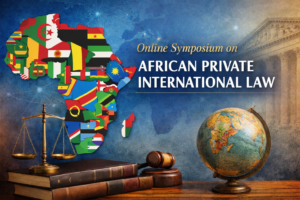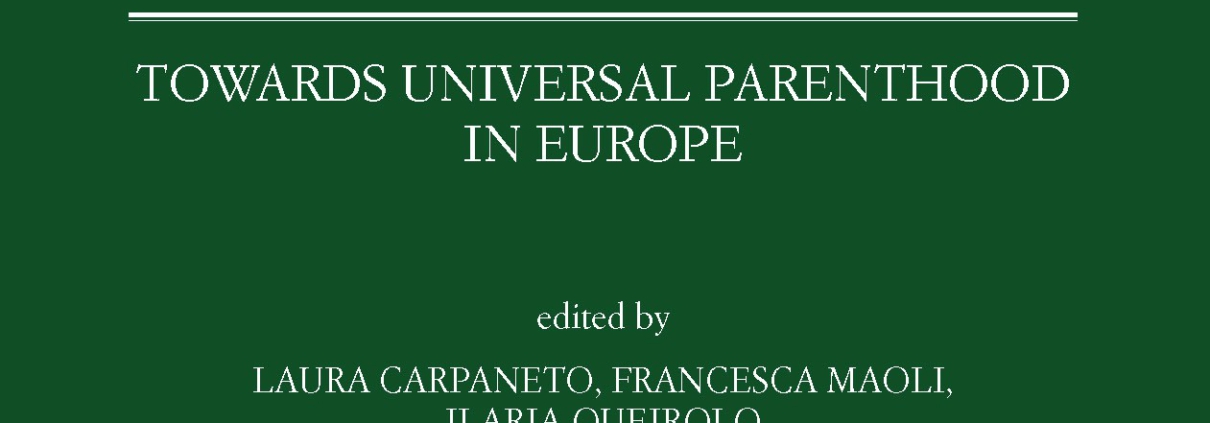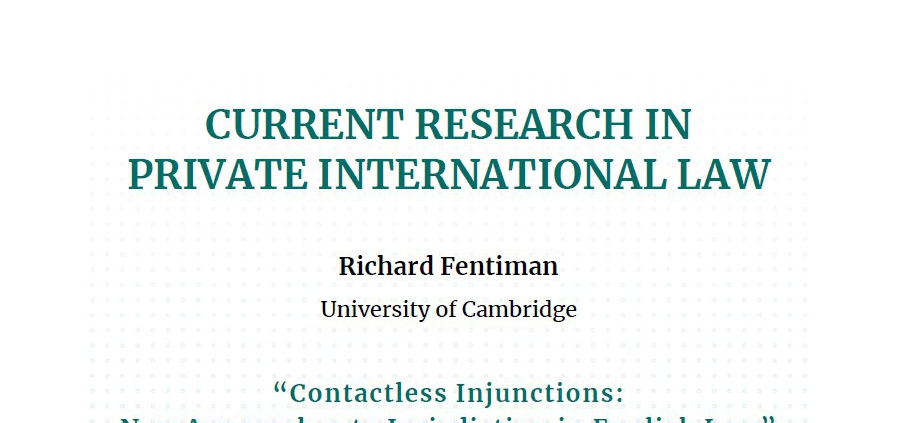Views
REFLECTIONS ON RECENT DEVELOPMENTS IN AFRICAN PRIVATE INTERNATIONAL LAW
I. INTRODUCTION
This is the second symposium relating to private international law in Africa to be hosted on this blog, following a series that has run consistently since 2 February 2026. The first symposium, which focused on private international law in Nigeria, took place on 14 December 2020 and was jointly hosted on Afronomics and this blog. It was organised by Professor Richard Frimpong Oppong and me.
Professor Beligh Elbalti and I are deeply grateful to the scholars who agreed to participate in this symposium at short notice, including Dr Solomon Okorley, Dr Theophilus Edwin Coleman, Dr Elisa Rinaldi, Miss Anam Abdul-Majid, Mr Kitonga Mulandi, Dr Boris Awa, and Dr Abubakri Yekini.
The idea for this second symposium originated with my dear colleague, Professor Beligh Elbalti, and I am thankful to him for involving me in the leadership and organisation of this project. The symposium finds its true genesis in a larger edited volume we are currently preparing on the recognition and enforcement of foreign judgments in Africa, which examines developments across no fewer than twenty-six African jurisdictions. Read more
Protection of Forced Heirs and International Public Policy
Written by Matteo Mangone, PhD candidate in Private Law at the University of Turin
Protection of Forced Heirs and International Public Policy: A Comparative Analysis of Germany and Italy in Light of the Bundesgerichtshof Judgment of 29 June 2022
1. The German Approach
The Bundesgerichtshof (Federal Court of Justice), in its judgment of 29 June 2022, affirmed the following legal principle: the protection of mandatory heirs pertains to German public policy and, consequently, pursuant to Article 35 of EU Regulation No. 650/2012, it is possible to disregard the lex successionis designated under Article 22 of the same Regulation whenever its application does not concretely guarantee mandatory heirs a level of protection at least equivalent to that ensured by German inheritance law. Read more
Online Symposium on Recent Developments in African PIL (VII) – South Africa’s Supreme Court of Appeal orders the return of a child under the Hague Child Abduction Convention

As part of the second online symposium on recent developments in African private international law, we are pleased to present the seventh an final contribution, kindly prepared by Solomon Okorley (University of Johannesburg, South Africa), which examines a decision of the South African Supreme Court of Appeal ordering the return of a child under the Hague Child Abduction Convention.
South Africa’s Supreme Court of Appeal Orders the Return of a Child under the Hague Child Abduction Convention: Marital Status of Parents not Important in Determining the Child’s Habitual Residence
News
Publication and Webinar: ELI Report on the EU Parenthood Proposal
Yesterday, the Project Report of the ELI Project “Enhancing Child Protection: Private International Law on Filiation and the European Commission’s Proposal COM/2022/695 final”
It contains constructive amendments to the original Commission’s Parenthood Proposal and intends to bring it more in line with the acquis and general considerations of EU PIL. Furthermore, it puts the best interest of the child in the focus of the analysis.
Recent Publication: Towards Universal Parenthood in Europe
The recently published book Towards Universal Parenthood in Europe (Editoriale Scientifica, 2025), edited by Laura Carpaneto, Francesca Maoli, and Ilaria Queirolo, offers a timely and rigorous contribution to European private international law and family law scholarship.
This volume follows the convention reported at this blog here and likewise presents the results of the UniPAR – Towards Universal Parenthood in Europe project, an EU-co-funded research initiative that addresses some of the most complex legal challenges in cross-border parenthood. Bringing together expert authors from different universities across European Union, the book combines theoretical frameworks with practical insights into how parenthood is recognised and regulated across different Member States. Covering six EU jurisdictions (Spain, Belgium, Italy, Bulgaria, Croatia and Poland) the book provides comprehensive national reports and comparative analyses on key issues of jurisdiction, applicable law, adoption, recognition of decisions and birth certificates and judicial cooperation in parenthood matters. The contents are available here.
This scholarly work advances the debate on the need for coherence in legal frameworks governing parentage and family relationships in European Union, especially in contexts involving cross-border mobility, assisted reproductive technologies and the recognition of family statuses across Member States. The final conclusions and recommendations serve both academic and policy audiences, offering structured reflections on legislative gaps and potential paths towards harmonised rules in EU private international law.This is an essential resource that deepens understanding of the legal implications of cross-border parenthood and strengthens the foundation for future legislative reform in European Union.
Richard Fentiman’s Lecture on Contactless Injunctions in English Law
Richard Fentiman will be speaking on “Contactless Injunctions: New Approaches to Jurisdiction in English Law” at the forthcomming virtual workshop in the Max Planck Institute for Comparative and International Private Law series “Current Research in Private International Law” to be held on on Tuesday, 3 March 2026, at 11:00 (CET).
Richard Fentiman is Professor Emeritus of Private International Law at the University of Cambridge. His research is especially concerned with the law and practice of international commercial litigation and in particular with issues concerning jurisdiction and interim remedies. He will be speaking about the practice of the English courts which regularly grant extraterritorial injunctions to freeze foreign assets or prevent foreign proceedings. In a departure from past practice they will now do so even in the absence of any material link with England. This reveals much about English law’s distinctive approach to injunctions and begs deeper questions about the appropriate grounds for exercising jurisdiction in private international law.
The virtual lecture will be held as a video conference via Zoom. Prior registions is necesarry by Monday, 2 March 2026, using this link.





